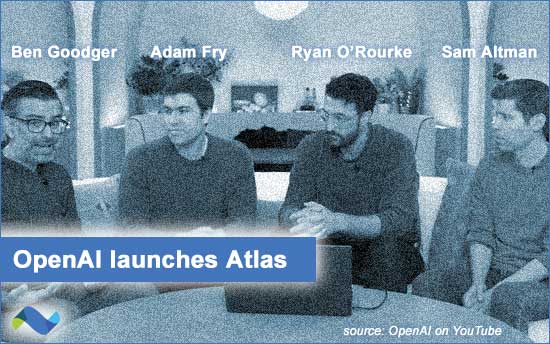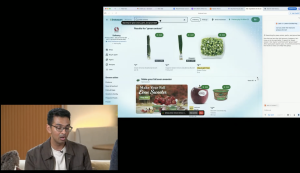It was only a matter of time. Yesterday, OpenAI announced Atlas, a new browser developed with ChatGPT built-in rather than as a web destination within, say, Google’s Chrome browser.
The product page explained:
“…your browser is where all of your work, tools, and context come together. A browser built with ChatGPT takes us closer to a true super-assistant that understands your world and helps you achieve your goals. With Atlas, ChatGPT can come with you anywhere across the web…”
The browser is only available for macOS, but is ‘coming soon’ to Windows, iOS, and Android.
More:
- Product page: Introducing ChatGPT Atlas (October 21) – OpenAI
- Download: Atlas (MacOS only) – OpenAI
- Video: See the recorded livestream (October 21) – YouTube
From tipsheet #1: The launch of the browser introduces more data for the OpenAI ad-engine-to-come. Presumably, data from your ChatGPT sessions within Atlas — and your browsing across the open web (if permissions allow) — will both inform OpenAI’s AI systems.
And on that note, see Atlas’ “Memories” on the product page:
“As you use Atlas, ChatGPT can get smarter and more helpful, too. Browser memories let ChatGPT remember context from the sites you visit and bring that context back when you need it. This means you can ask ChatGPT questions like: “Find all the job postings I was looking at last week and create a summary of industry trends so I can prepare for interviews.” Browser memories in Atlas are completely optional, and you’re always in control: you can view or archive them at any time in settings, and deleting browsing history deletes any associated browser memories.”
From tipsheet #1: Even though Atlas was inevitable, the Chrome browser losing share to Atlas puts Google on its heels again… unless the Atlas browser completely bombs. (I’m sure there will be plenty of industry studies to help us understand the impact in the weeks and months to come.)
LLMS & CHATBOTS
Browser wars: Atlas agent mode
One feature of particular interest is “agent mode” within the Atlas browser which is described as the native version of “ChatGPT agent” announced in July.
See the YouTube video beginning at 11:42.
Over time, users are essentially training an Atlas agent to act on their behalf.
From the demo, one can immediately see how autonomous buyer’s agents will work as trust is quickly built with the consumer. The OpenAI team in the Atlas launch video shows how an Instacart shopping cart can be autonomously populated (See video at 19:00) and await the consumer’s final approval.
The OpenAI developers emphasized that the ChatGPT agent only works within one’s Atlas browser tabs (“It can’t execute code…”) and the consumer is in control through various settings.
LLMs & CHATBOTS
Browser wars: Fidji Simo
Even though she wasn’t a part of the launch video with CEO Sam Altman, Fidji Simo, CEO of Applications at OpenAI, took her turn to promote the new Atlas browser on LinkedIn and in her Substack. Ms. Simo wrote:
“By connecting ChatGPT to all these parts of your life and understanding more about what you’re trying to accomplish, we can do a much better job putting this incredibly powerful intelligence at your service, including proactively (like we started with Pulse last month). As always, we’ve prioritized safety, privacy and control, so you decide what ChatGPT can see and remember from your browsing history, and agent mode always operates within clear boundaries.
When we first released ChatGPT, we weren’t sure how people would use it. Now that we have feedback and signals from hundreds of millions of people around the world, it’s clear ChatGPT needs to become so much more than the simple chatbot it started as…”
Read:
-
“Launching our new browser, ChatGPT Atlas” (October 21) – Fidji Simo, CEO of Applications, OpenAI on her substack
From tipsheet: Ms. Simo is the top executive in charge of bringing advertising to OpenAI and ChatGPT. Her team is building trust with consumers ahead of what could be a transformative advertising experience given OpenAI’s knowledge about the consumer and its AI. Google, Anthropic, Perplexity, and others have this opportunity to different degrees, too.
LLMs & CHATBOTS
Developments
- Anthropic, Google in Talks on Multibillion-Dollar Cloud Deal (October 21) – Bloomberg (subscription)
- Meta in $27 billion financing deal with Blue Owl Capital for Louisiana data center (October 21) – Reuters (subscription)
- The new Perplexity TV app is rolling out to Samsung’s 2025 TVs first, with older models getting it later this year. (October 21) – ZDnet
SELL-SIDE
Traditional search referrals not so valuable
Anecdotal evidence points to a loss of traffic for publishers due to AI — and a decline in Google Search referrals — but that hasn’t necessarily meant a loss in revenue
The Information’s Catherine Perloff reported on LinkedIn yesterday:
“I spoke to 7 brands, including some in the Fortune 500, who have all seen declines in traffic in the past year from Google, though for the vast majority revenue hasn’t been affected — yet.
It might be that some of the visitors Google brought before weren’t that valuable anyway. Tafer Hotels used to get traffic from people searching on terms like ‘Cancun weather.’ ‘Was that valuable traffic for us?’ said Max Gomez Montejo. ‘Probably not.’
Plus, visitors from AI search engines are more likely to actually buy a product, even if they can’t yet make up for the loss of traffic. But marketers might eventually be impacted, so they’re not sitting still, shifting ad spend to areas like TV and rewriting their websites to make them more AI-friendly.”
Read: “AI Enigma: Search Traffic Drops to Sites, but Revenue Doesn’t—Yet” (October 21) – The Information (subscription)
From tipsheet: Is the narrative changing for publishers regarding AI? AI brings… efficiency? At the very least, AI should reduce or remove the spammy underbelly of publishing. And the cream rises to the top.
EARNINGS
Netflix seeing ad growth, AI benefits
Netflix reported its Q3 2025 earnings yesterday and things are looking good for ads even if the company’s often-volatile results didn’t meet Wall Street expectations.
Adweek’s Bill Bradley covered the highlights including:
“2X—Netflix says it doubled its upfront commitments in the latest cycle and recorded its best ad sales quarter.”
“17%—Revenue growth year over year in Q3, driven by membership growth, pricing adjustments, and ad revenue increases.”
According to Bradley, Netflix added:
“Moving forward, the company also noted its commitment to generative AI, which it said ‘presents a significant opportunity’ to deliver benefits to members, creators, and the business. These include improving recommendations, arming creators with tools to ‘achieve their visions and deliver even more impactful titles,’ and utilizing AI in new ad formats.”
Read more in Adweek. (October 21)
More:
- Netflix Q3 2025 Earnings – Netflix
- Netflix Revenue and Profit Grow as Ad Business Accelerates (October 21) – The Wall Street Journal (subscription)
From tipsheet: Netflix’s market capitalization stood at $527 billion at the market’s close yesterday. The company’s stock has appreciated nearly 50% year-to-date.
CONNECTED TV
Roku on creative, SMBs and AI
On the latest episode of the Next in Media podcast with Mike Shields, Roku’s Head of Ad Innovation Peter Hamilton discussed CTV and what’s next — including AI-driven creative experimentation especially with SMBs.
Mr. Hamilton shared:
“We’ve seen a lot of experimentation on our platform with [AI] for sure in self-service.
We’ve got lots of advertisers that want to try out say… 10, 20, 30 different video ads. We see the AI spokesperson or avatar-style, as the most common–where the spokesperson is breaking the ‘fourth wall’ and talking about the product.
We have worked with lots of different creative partners, too — such as Spaceback, where they’re taking social posts and turning them into video creative. There’s a lot of experimentation in that area.
Roku is taking the position that we want to be an ‘open’ platform. We want to accept creative of all kinds and types. And let the best creative win.”
Hear more on Apple Podcasts app. (October 21)
ANALYSIS
Seufert on advertising in ChatGPT
On Mobile Dev Memo, analyst Eric Seufert distilled new ChatGPT revenue and user data that was leaked to the Financial Times last week.
According to Mr. Seufert, the data made a strong case for ChatGPT integrating an advertising opportunity given 95% of users today use the ChatGPT free tier (the other 5% are buying subscriptions).
He explained on Monday:
“As ChatGPT’s users embrace eCommerce purchases, producing commercial intent artifacts that can be used for ad targeting, the company can monetize free usage with personalized advertising. Not only is advertising an accretive revenue opportunity (that will very likely have a negligible impact on churn), but it also gives OpenAI pricing power on its paid tiers. Netflix’s experience is clarifying here: after introducing ads to its Basic tier, the company was able to institute several price increases for its premium tiers, culminating with the elimination of the Basic tier altogether, with ads applied to the Standard tier.”
Read more on Mobile Dev Memo. (October 21 – subscription)
AGENCIES
Careful what you personalize
Dani Mariano, CEO of Publicis agency Razorfish, delivered an op-ed on AdExchanger on personalization.
On LinkedIn, where she teased the piece, Ms. Mariano wrote, “With AI pushing personalization front and center, I have to ask – just because we can personalize every interaction, does it mean we should? I’m a huge advocate for personalized marketing BUT with context and authenticity.” See LinkedIn. (October 21)
Read: “Personalization Isn’t Everything: The Case For Marketing That Brings People Together” – AdExchanger (October 21)
Related: Amid earnings report, Omnicom says it expects to close IPG takeover in November (October 21) – Adweek
RESEARCH
Mad at Meta and its AI chatbot
Scott McDonald, CEO of the Advertising Research Foundation (ARF) and professor at Columbia University, announced on LinkedIn that he believed Meta needed to rethink its AI chatbot strategy — part of Meta’s Business AI suite:
“Meta’s decision to use private AI chats for ad targeting crosses a line that advertisers should pause on. Personalization is valuable, but when private conversations become data points, the trust breaks. AI can make advertising smarter, but not at the expense of privacy. Why not offer an opt-out and make transparency & trust a key differentiator?”
See his comment on LinkedIn. (October 20)
From tipsheet #1: The ARF claims 400+ members today across marketers, agencies, publishers and ad tech. Whether Mr. McDonald is making a statement on behalf of ARF or himself is not clear. But, the privacy-first philosophy inherent in his comment isn’t new for the non-profit organization. Also, AI is potentially seen as a threat to some ARF members such that slowing down a “walled garden” may make strategic sense.
From tipsheet #2: Chatbots are going to use their users’ data to optimize and target ads in the future. Meta may have been the first company to overtly say it.
TECH
Quote of the day
“I find it interesting that many folks speak about the web display (banner) ad tech architecture as if it is in place across the entire open internet. Meanwhile, the majority (and higher growth) areas such as CTV, most of mobile app, and much of short-form video are structured very differently from a technology perspective.“
MORE
- Advertising’s new ‘universal language’ for AI agents (AdCP) sparks old debates about power and openness (October 21) – Digiday (subscription)
- YouTube’s likeness-detection technology has officially launched (October 21) – TechCrunch
- Black boxes aren’t a necessary tradeoff for performance – Jason Fairchild, CEO, tvScientific on his blog
- AI has a SpongeBob problem… i.e. copyright (October 21) – Politico
- Partnerize launches VantagePoint, a GenAI conversion attribution solution for the machine-mediated market (October 21) – press release


